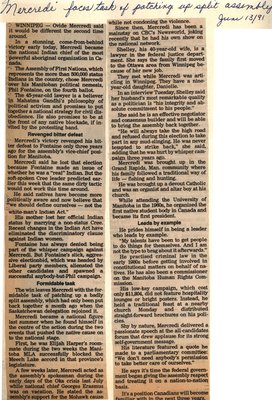"Mercredi Faces Task of Patching Up Split Assembly"
- Full Text
- Mercredi faces task of patching up split assembly
WINNIPEG - Ovide Mercredi said it would be different the second time around.
In a stunning, come-from-behind victory early today, Mercredi became the national Indian chief of the most powerful aboriginal organization in Canada.
The Assembly of First Nations, which represents the more than 500,000 status Indians in the country, chose Mercredi over his Manitoban political nemesis, Phil Fontaine, on the fourth ballot.
The 45-year-old lawyer is a believer in Mahatma Gandhi's philosophy of political activism and promises to put together a national strategy for civil disobedience. He also promises to be at the front of any native blockade, if invited by the protesting band.
Revenged bitter defeatMercredi's victory revenged his bitter defeat to Fontaine only three years ago for the assembly's vice-chief position for Manitoba.
Mercredi said he lost that election because Fontaine made an issue of whether he was a "real" Indian. But the soft-spoken Cree leader predicted earlier this week that the same dirty tactic would not work this time around.
He said natives have become more politically aware and now believe that "we should define ourselves - not the white-man's Indian Act."
His mother lost her official Indian status by marrying a non-status Cree. Recent charges in the Indian Act have eliminated the discriminatory clause against Indian women.
Fontaine has always denied being part of the whisper campaign against Mercredi. But Fontaine's slick, aggressive electionbid, which was headed by Liberal party members, alienated the other candidates and spawned a successful anybody-but-Phil campaign.
Formidable taskThe win leaves Mercredi with the formidable task of patching up a badly split assembly, which had only been put back together a month ago when the Saskatchewan delegation rejoined it.
Mercredi became a national figure last summer when he found himself in the centre of the action during the two events that pushed the native cause on to the national stage.
First, he was Elijah Harper's roommate during the two weeks the Manitoba MLA successfully blocked the Meech Lake accord in that province's legislature.
A few weeks later, Mercredi acted as the assembly's spokesman during the early days of the Oka crisis last July while national chief Georges Erasmus was on vacation. He stated the assembly's support for the Mohawk cause while not condoning the violence.
Since then, Mercredi has been a mainstay on CBC's Newsworld, joking recently that he had his own show on the national network.
Shelley, his 40-year-old wife, is a lawyer in the federal justice department. She says the family first moved to the Ottawa area from Winnipeg because of her new job.
They met while Mercredi was articling in Winnipeg. They have a nine-year-old daughter, Danielle.
In an interview Tuesday, Shelley said her husband's most remarkable quality as a politician is "his integrity and absolute commitment to his people."
She said he is an effective negotiator and consensus builder and will be able to bring the assembly back together.
"He will always take the high road and refused during this election to take part in any mud-slinging. He was never tempted to strike back," she said, adding that he was hurt by whisper campaign three years ago.
Mercredi was brought up in the Grand Rapids, Man. community where his family followed a traditional way of life - fishing and hunting.
He was brought up in the Grand Rapids, Man. community where his family followed a traditional way of life - fishing and hunting.
He was brought up a devout Catholic and was an organist and altar boy at his church.
While attending the University of Manitoba in the 1960s, he organized the first native student body in Canada and became its first president.
Leads by exampleHe prides himself in being a leader who leads by example.
"My talents have been to get people to do things for themselves. And I am not the type to brag about it afterwards."
He practised criminal law in the early 1980s before getting involved in constitutional matters on behalf of natives. He has also been a commissioner on the Manitoba Human Rights Commission.
His low-key campaign, which cost only $11,804, did not feature hospitality lounges or bright posters. Instead, he held a traditional feast at a nearby church Monday and distributed straight-forward brochures on his policies.
Shy by nature, Mercredi delivered a passionate speech at the all-candidates forum that drew applause for its strong self-government message.
His literature featured a quote he made to a parliamentary committee: "We don't need anybody's permission to take better care of ourselves."
He says it's time the federal government began giving the assembly respect and treating it on a nation-to-nation basis.
It's a position Canadians will become familiar with in the next three years.
- Media Type
- Newspaper
- Publication
- Item Types
- Articles
- Clippings
- Description
- "Ovide Mercredi said it would be different the second time around. In a stunning, come-from-behind victory early today, Mercredi became the national Indian chief of the most powerful aboriginal organization in Canada."
- Date of Publication
- 13 Jun 1991
- Subject(s)
- Personal Name(s)
- Mercredi, Ovide ; Fontaine, Phil ; Gandhi, Mahatma ; Harper, Elijah ; Erasmus, George.
- Corporate Name(s)
- Assembly of First Nations ; Manitoba Human Rights Commission.
- Local identifier
- SNPL003000v00d
- Collection
- Scrapbook #3
- Language of Item
- English
- Creative Commons licence
 [more details]
[more details]- Copyright Statement
- Public domain: Copyright has expired according to Canadian law. No restrictions on use.
- Copyright Date
- 1991
- Contact
- Six Nations Public LibraryEmail:info@snpl.ca
Website:
Agency street/mail address:1679 Chiefswood Rd
PO Box 149
Ohsweken, ON N0A 1M0
519-445-2954



